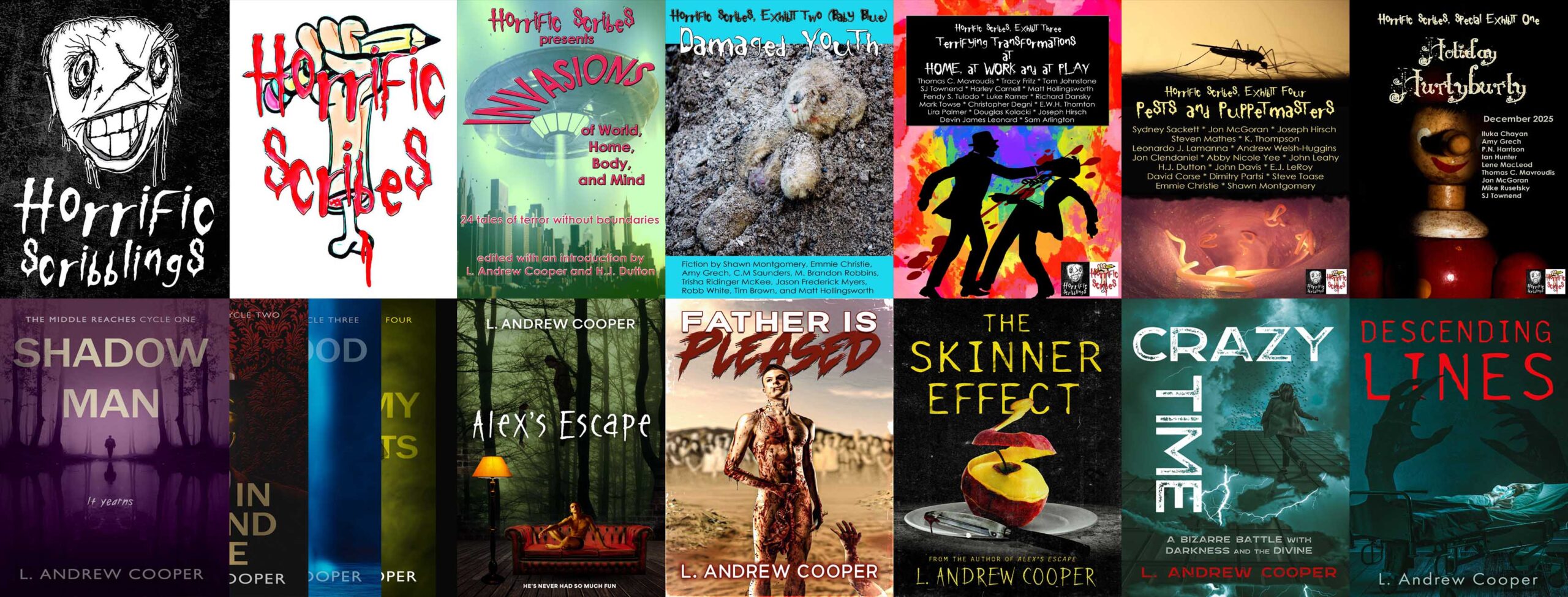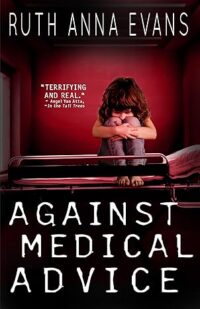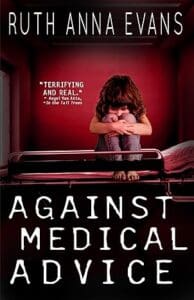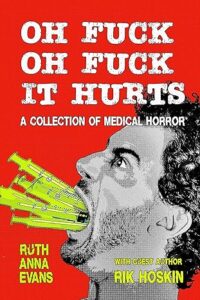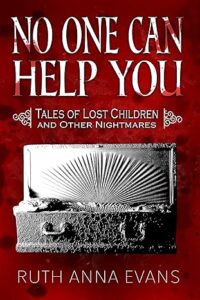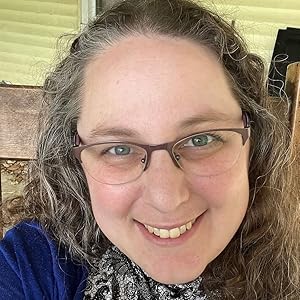The way Ruth Anna Evans’s new novella Against Medical Advice turns very relatable fears about sickness and medicine into a believable–and horrific–scenario results in a serious page turner. Here she reflects on some of the reasons why her story works.
Against Medical Advice
Frank’s six-year-old daughter Maddie is sick. Very sick. Her mother is out of town, and he’s on his own to handle the emergency. But the doctors can’t find anything wrong, and money is quickly running out. Frank is desperate, and he begins to consider the unthinkable.
Shelly is a social worker with a pill problem. When a case spins out of control, she finds herself out of pills and at the end of her rope. Then she gets a call to check into a tip from an EMT: A father who may be making his own daughter ill. Will Shelly intervene in time, or will she fail to save a child… again?
From the author of OH FUCK OH FUCK IT HURTS comes this gripping, fast-paced novella of medical horror that will make you question: How far would you go when the only thing you can do is Against Medical Advice?
The Interview
1. Medical Horror. I can’t claim to be an expert on medical horror, but Against Medical Advice strikes me as very different from classics like Frankenstein (1818) and The Island of Dr. Moreau (1896), or more recent standards in the vein of Robin Cook, or even films like Anatomy (2000) or The Human Centipede (2009). What motivated you to turn from this doctor-centered tradition to a story centered on parent and patient? What’s the attraction of medical horror for audiences, and what do you like most about writing it? What’s its relation to body horror? On the surface, Against Medical Advice and The Human Centipede seem to have nothing in common, but is that the case?
RAE: My style is horror realism with a touch of extreme body horror. To do that, I have to tap into my own fears and experiences, which revolve around my experiences with being sick and dealing with health insurance and all of the frustrations that come with having a body that is stubbornly not well. I fear pain, I fear suffering, I fear losing all of my money and having nothing to show for it. But even more that that, I fear these things happening with my child. Parenting is the most frightening role I’ve played in my life, so that’s why I write that type of horror. I don’t read like traditional medical horror in part because I don’t read a lot of traditional medical horror. It’s too scary!
2. Medical Industrial Horror. A great deal of tension in the story comes from Frank’s struggle with insurance that offers insufficient help in his emergency, requiring copays and out-of-pocket expenses that obstruct care. Am I fair in saying that the medical industry, particularly insurance companies and managed care, are a source of horror in this story? Why or why not? How much of Frank’s reaction to his experiences—and perhaps the reader’s reaction to the story—depend on perceptions of the medical industry as a giant corporate evil?
RAE: For sure. My collection OH FUCK OH FUCK IT HURTS goes even further down this route. There is just so much fear and frustration when you are sick and no one is helping you get better, but they are charging you out the teeth. Or when there is a treatment that would help, but you have to jump through impossible hoops to get it. I have a lot of financial fear in my life as well; I live in fear of not having enough to get through an emergency. And I see a lot of people running unsuccessful gofundme’s for life and death situations. This horror is real and immediate, which is why I think it’s so effective.
3. Medical Information Horror. When Frank tries to resist Googling medical conditions and then gives into temptation, I’m sure I’m not the only reader who relates. Feelings of impersonal treatment related to the industrialization of medicine we’ve been discussing have reduced doctor-patient trust, leading some patients to accept alternative authorities they encounter online and elsewhere. Frank considers such authorities. Is Against Medical Advice critical of the growing trend toward internet-motivated medical decisions? Why or why not? I don’t think I’m spoiling too much by saying Frank becomes a bit paranoid. Is paranoia an inevitable condition of living in a free information culture? Does the freedom of (allegedly) medical information online erode professional medical authority and therefore pose a threat to public safety? Why or why not?
RAE: I think we’ve all googled our symptoms and come across something saying we are dying. This isn’t so much a critique of that as an exploration of what happens when you listen to all of that noise. When you aren’t getting answers the traditional way, you’ll grasp onto anything. I remember I was certain CBD would cure my colon inflammation. It didn’t, but I was so sure. You get to where you believe this stuff, and you just don’t know when you’re wrong.
4. Healthcare and Economic Class. Your converging tales of Frank and Shelly aptly demonstrate the gaps class creates for healthcare access. While Frank scrambles to pay for the tests his doctors demand for his daughter, Shelly has plenty of cash she can use to exploit an impoverished case subject to supplement her legitimate pill supply. In the world of Against Medical Advice, is reliable healthcare a privilege of the upper classes? For me, at least, one of the most horrific and heartbreaking aspects of the story is the obstacle that money becomes for Frank and his wife Tish as they try to help their daughter. Does your book critique health care in the hands of capitalism? Does it take a position within current debates about health care being a matter of economic access or a matter of human rights? Why or why not?
RAE: I definitely critique the health insurance/health care system. It’s not fair that if you don’t have money, you can’t access all of the treatment people with money can. You have to wait for your insurance company to say yes, and sometimes they say no, and you’re shit out of luck. I think most Americans can attest to the fact that it’s scary having your health—even your life—at the mercy of somebody sitting in an office shuffling paperwork.
5. Good Parents and Bad Parents. With Frank’s and Shelly’s sides of the story, you provide different perspectives on parenting and child protection. As a social worker, Shelly, though unorthodox, stands in for a community or governmental view of sufficient parenting. How valid are these categorical ideas of “good” and “bad” applied to the specific circumstances of individual families? Does Shelly’s “pill problem” suggest a critique of these types of judgments? Frank and Tish want to be “good” parents for Maddie, but they can’t always tell in advance which decisions will be “good,” and the blame they place on themselves might be as painful as the blame they receive from others. Do you count social pressure to be “good” parents who somehow know everything among your book’s horrors? Why or why not?
RAE: I think what I’m trying to say is that most parents are doing the best they can, but sometimes their best is not only not good enough, but actively harmful to their children. It’s scary and sad and perfect for horror.
6. Fathers and Heroism. On the subject of good and bad parents, fatherhood seems problematic in this story. Early on, Shelly observes, “the people whose children she took usually started out loving and caring for their children. At least the mothers. The fathers gave less of a fuck, usually.” Are fathers deficient parents? No matter how hard Frank tries, Maddie keeps calling for her Mommy, and Frank keeps wishing Tish were home because she would know how to handle things. Are fathers disadvantaged parents? As Maddie’s illness stretches on, Frank repeats to himself, “I have to do something,” adopting what I think of as the “Mr. Fix It” attitude, an assumption common among men (I say) that they both can and should become the problem-solving heroes in any given situation. All your characters are flawed—how much of Frank’s imperfection comes from patriarchal presumptiveness?
RAE: This is a really insightful question! I feel like fathers have such different roles from mothers, and I was definitely exploring that, albeit a bit subconsciously. I just write what feels real, and when it resonates, I feel like I’ve hit on something. Frank’s love for his daughter is unquestionable, and the pressure to make her better even without the resources to do so drives him crazy. I think a mother would feel the same way, but she might be a little more practical in her approach. I do think there are more crappy fathers than there are crappy mothers, when you come to talking about parents who don’t care for their children. But there are plenty of crappy mothers, too. Plenty of awfulness to go around.
7. Social Workers and Heroism. You dedicate Against Medical Advice partly to social workers you call “heroes.” However, parents in your story, like many parents in real life, fear intervention from Child Services and people like Shelly in their family affairs, seeing them more as villains than heroes. Even Shelly recognizes that taking kids away from their families and putting them in “the system” can make things worse, and she sometimes feels like an “invader.” What makes a social worker or other official who intervenes in private family life villainous or heroic? With all her flaws, is Shelly a hero? Why or why not? How did you research her character? Do you think her experiences are like experiences many social workers actually have? Why or why not?
RAE: Social workers put themselves in the middle of impossible, tragic situations, with the goal of helping children have better lives. That is very brave. As a teacher, I’ve seen some of these unsolvable situations—horribly abused children who need to be removed. I can’t personally fathom having it be my job to try and put a broken child’s life back together. It takes heroism. Certainly there are bad social workers—and even the good ones may make some bad decisions in situations where there aren’t any good options. But I think in general the negative things they do are a result of the system, and the positive they do are the results of great personal strength. I’m talking about the good ones in my dedication. They definitely exist.
8. Addiction and Other Post-Traumatic Behaviors. Both Shelly and Frank struggle with traumatic memories that give them trouble with medical and child protective authorities. As children, Shelly dealt with an abusive, alcoholic mother, and Frank saw his mother through a terminal illness. To what extent have these traumas determined where the characters stand in the story’s present? Shelly has inherited anxiety (and probably a predisposition for addiction) from her mother, which seems connected to her habit of taking more than her prescribed doses of benzodiazepines but also her mission as a social worker. Has trauma compromised her? Inspired her? Both? Frank has an aversion to hospitals from all the time spent in them with his mother. What role does his traumatic past play in his relationship with the medical establishment and his potentially problematic need to be a hero? Is trauma destined to pass from caretakers to children? In short, what’s your book’s vision of trauma’s long-term impacts?
RAE: Trauma is my bread and butter as a writer. We all have it, unless we have been very very lucky, and it always rears its ugly head later in life. Until you deal with your trauma, it’s going to negatively impact you and the people around you. Shelly and Frank make messes of a lot of things because of unresolved trauma. Frank feels like he personally has to save his daughter. Shelly fails to cope with situations that remind her of her past. It makes for a rounder story, but it also helps the story ring true.
9. Child in Peril. Against Medical Advice is an intense read—had I not been interrupted, I would have finished it in a single sitting. Even though I don’t have kids, I felt Frank and Tish’s panic over Maddie’s illness, and I related to their turns of thought. How do you make their predicament so relatable while delivering their story at such a breakneck pace? How do you convey the nightmarishness of Frank’s experiences without ever abandoning realism? Children in peril can provide great narrative motivation, but from the writing perspective, they can be emotionally exhausting. What was the most difficult aspect of this book for you to write?
RAE: I always try to write one-sitting reads. I write in short bursts in an excited state. And my characters draw me through the story, as I hope they draw my reader through the story. I also focus a lot on plot. As a reader, I am obsessed with good plot. If you don’t have something happening on every page, what are you even doing? I don’t waste my time as a writer. The number one criticism of my books is that they are too short, but I’d rather my book be too short than let you put it down.
Children in peril is definitely a recurring theme in my work. I did a whole collection of stories called NO ONE CAN HELP YOU: Tales of Lost Children and Other Nightmares. It’s not emotionally exhausting so much as it feels very real. It’s cathartic. I hope it’s cathartic for my readers and their fears.
10. Access! How can readers learn more about you and your works (please provide any links you want to share)?
RAE: Website: ruthannaevans.com
Email: ruthannaevanshorror@gmail.com
BlueSky: Ruth Anna Evans
Facebook: Ruth Anna Evans
Instagram: ruthannaevanshorrors
About the Author
Ruth Anna Evans is a writer of short horror fiction who lives in the heart of all that is sinister: the American Midwest. She has been composing prose of all types since childhood but finds something truly delightful in putting her nightmares on the page. Her stories are full of twists and turns with relatable protagonists and startling endings. She has published several novellas, a collection of short stories, and her work can be found in horror anthologies from Hungry Shadow Press, D&T Publishing, and Gloom House Publishing. Follow Ruth Anna on Twitter (X) @ruthannaevans for updates on her work.
